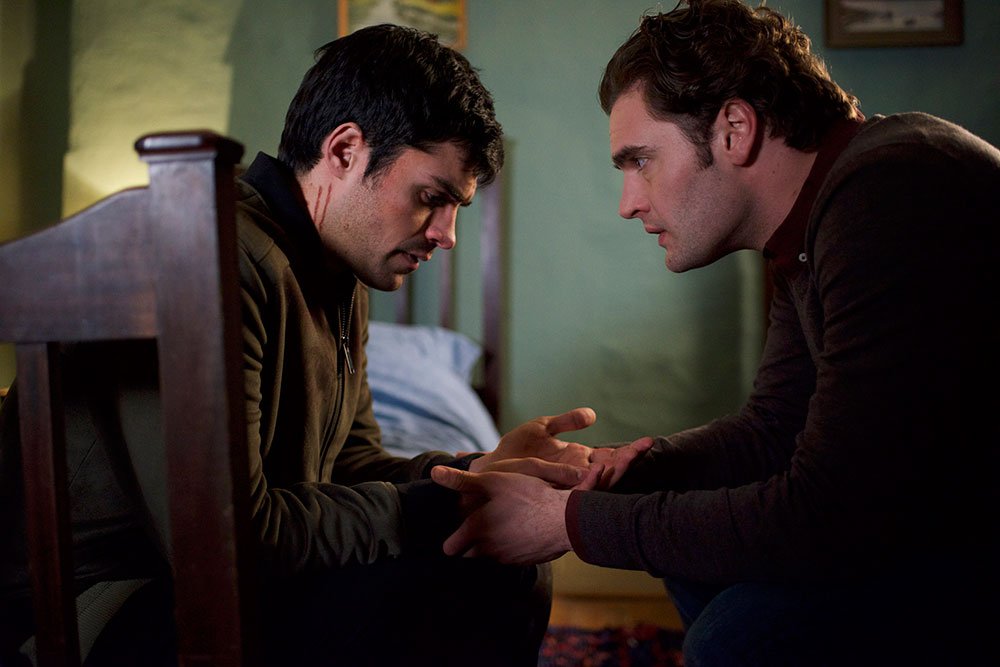From the opening shots of B&B, we know something isn’t right.
From a cruising park seen through the grainy, green viewfinder of an unknown wearer’s night-vision goggles, we’re quickly transported to a countryside bed and breakfast, where newlyweds Fred and Marc are checking in.
Nestled among the many conspicuous crucifixes on the walls of the small inn is Marc’s own face, staring back at him from the front page of a local newspaper.
This isn’t the couple’s first stay here, but they clearly haven’t been back since winning a lawsuit allowing them to share a bed at this all-but-exclusively straight Christian establishment.
Back to claim the space they should never have been denied, Marc is intent on making a point, while Fred is visibly uncomfortable, preferring to walk away with his victory.
Clearly this won’t be a relaxing vacation.
B&B is steeped in the threat that comes with simply being oneself publicly. It’s not so much a parable about the queer experience as it is a frighteningly realistic scenario about surviving in a hostile environment, whether it’s society as whole or the intimate setting of a quaint B&B in rural England.
Though Marc seems to find peace and even an almost playful rivalry with the innkeeper Josh, things get complicated when Josh’s son Paul begs Fred not to stir things up. It seems that Josh’s Christian household may not be the bastion of loving “traditional values” that he thinks he’s upholding.
And when a mysterious stranger checks in, Marc and Fred begin to suspect they’ve picked a fight they may not be ready to see all the way through.
One of the film’s strongest points is the uncertainty that surrounds just about every detail. Is the stranger a gaybasher? Is he gay himself? Was he hired by Josh to intimidate the couple (or even kill them)? Will Josh stand up for them, or will he turn a blind eye? Is there a perfectly innocent explanation for everything?
Horror films and thrillers are generally good at masking their message. Monsters are rarely just monsters. They stand for something, whether that’s childhood trauma or wartime anxieties — or, in more conservative titles, female or queer sexuality, or the breakdown of traditional gender roles. Alfred Hitchcock’s films famously drew on Freudian psychoanalysis to explore repressed emotions waiting to burst out.
But lately we’ve seen a shift to more literal monsters, pushed to their extremes in fantastical ways but still holding onto a more direct link to real-world horrors. Get Out brilliantly tackled racism in this vein, and It Follows condemned rape culture and victim-blaming.
Similarly, B&B is a distinctly queer horror story of homophobia in several layers.
The paranoia, claustrophobia, and fear in the film will be familiar to fans of thrillers and horror, but having those tropes transposed onto a queer story — particularly one with the mundane premise of a quiet weekend in the country — packs quite a punch. We know the world can still be openly hostile to queer people, but B&B is much more concerned with the everyday intolerance of hushed indignation and not-so-subtle looks of discomfort.
Interestingly, the homophobic innkeeper is also the character the couple gets along with best. Josh may not want to see them kiss or hold hands, and he certainly believes they’re going to hell for their sins, but he’s also oddly civil in their presence. His attitudes may be reprehensible and his civility court-ordered, but the modicum of effort he makes to at least be a decent host feels like a rather compassionate nod, on the part of director Joe Ahearne, to the three-dimensional humanity of even the most judgemental of bigots.
What B&B really wants to know is: what comes next? Marc and Fred have won their lawsuit, and Josh has, perhaps grudgingly, accepted them back into his home/business. But is Josh’s outward tolerance enough to put any of them at ease? More importantly, how far does Josh’s tolerance extend? Will he call the police if the gay couple’s safety is threatened? Will he recognize a threat against them? Will he care?
In the end, that grey area where seemingly peaceful coexistence can turn violent in an instant is what fuels this film’s tension, and taps into the all-too-real fears in many people’s lives.


 Why you can trust Xtra
Why you can trust Xtra


